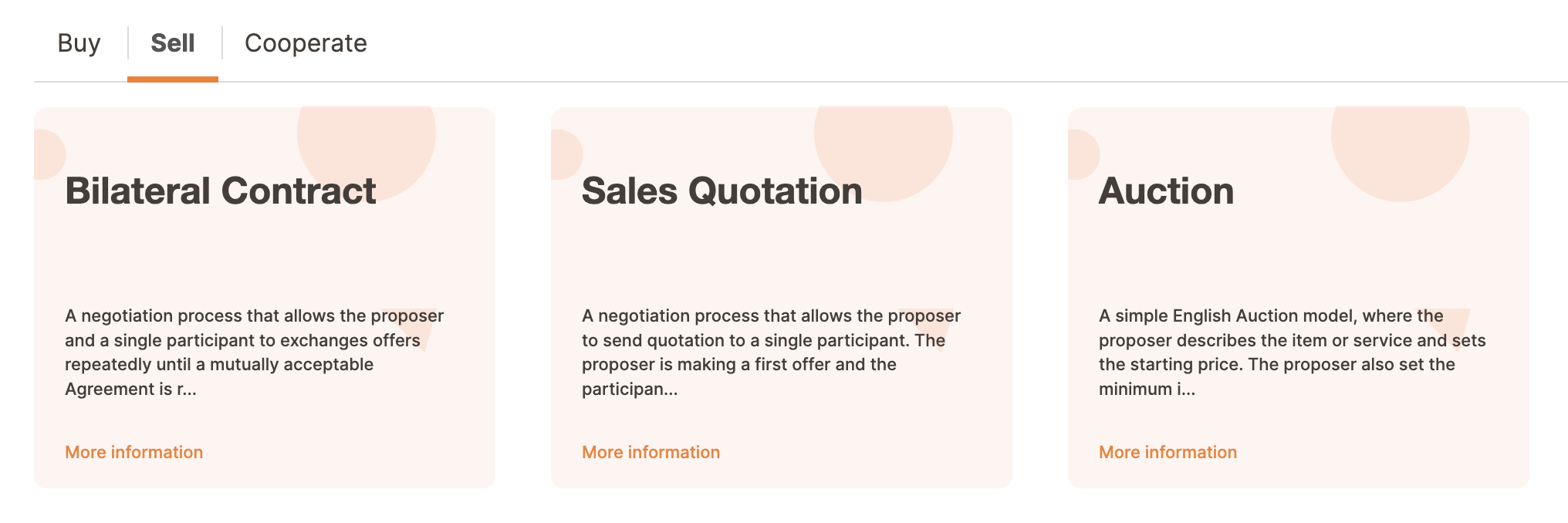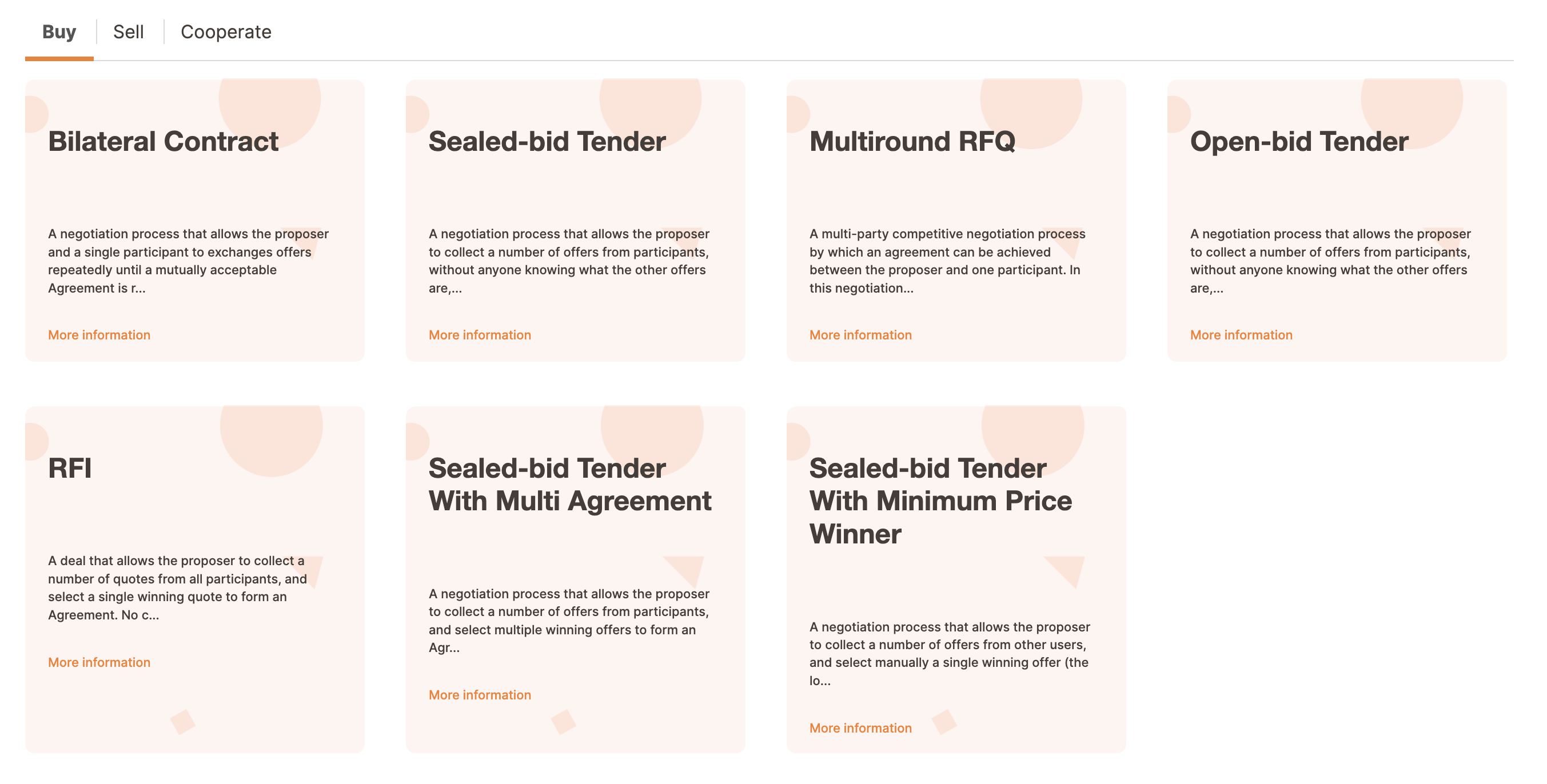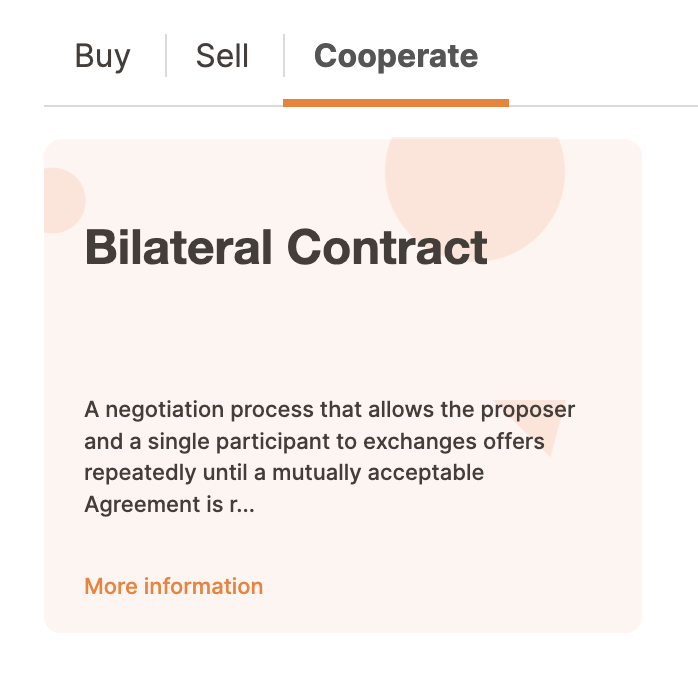Deal types explanation
Dennis
Last Update 2 years ago
Trakti supports buy side, sell side, onboarding and collaboration type of deals. We offer basic processes that support all your functions during contract negotiation and signature collection. Following a description of all the processes supported by us.
SELL: Sales Functions

Auction: A simple English Auction model, where the proposer describes the item and sets the starting price. The proposer also sets the minimum increment between bids. Counterparties must provide a bid with at least the current winning bid amount plus the increment, for the bid to be valid. The winner is the counterparty who proposed the highest bid at the deadline. For more information click here.
Bilateral Contract: A negotiation process that allows the proposer and a single counterparty to exchange offers repeatedly until a mutually acceptable agreement is reached. You can have multiple iterations, with offers and counter offers. The negotiation ends as soon as one of the parties accepts one of the offers proposed by the other, or as soon as one of the parties decides to abandon the deal. For more information click here.
Quotation: A negotiation process that allows the proposer to send a quotation to a single counterparty. The proposer is making a first offer and the counterparty can accept or ask for a change. The negotiation ends as soon as the counterparty accepts the offer, or as soon one of the parties decides to abandon the deal. For more information click here.
The quotation is the only process that does not require a Contract Model but only a disclaimer and has a different user experience and flow.
BUY: Procurement and HR

Bilateral Contract: A negotiation process that allows the proposer and a single counterparty to exchange offers repeatedly until a mutually acceptable agreement is reached. You can have multiple iterations, with offers and counter offers. The negotiation ends as soon as one of the parties accepts one of the offers proposed by the other, or as soon as one of the parties decides to abandon the deal. For more information click here.
Multiround RFQ: A multi-party competitive negotiation process by which an agreement can be achieved between the proposer and a counterparty. In this negotiation process, the proposer can negotiate multiple rounds with counterparties in order to reach an agreement. In this process, the proposer first collects offers from all counterparties, and then he can choose an offer and propose a counteroffer to the counterparty while other counterparties wait to get a response from the proposer. After getting a counter offer the counterparty can accept the offer, reject the offer, or propose a counteroffer to the counterparty. When the proposer reaches an agreement with a counterparty, other counterparties are automatically notified with a rejection response. If the proposer does not like any of the received offers, he can reject all offers which leads to the end of the negotiation without any agreement. For more information click here.
Open-bid Tender: A negotiation process that allows the proposer to collect a number of offers from other users, and select a single winning offer to form an Agreement. The Proposer views all incoming offers as they're coming and can select any offer from the list of valid offers. For more information click here.
RFI: A negotiation process that allows the proposer to collect a number of quotes from other users, and select a single winning quote to form an Agreement. For more information click here.
Sealed-bid Tender: A negotiation process that allows the proposer to collect a number of offers from other users, and select a single winning offer to form an Agreement. The Proposer can select any offer from the list of valid offers. For more information click here.
Sealed-bid Tender With Minimum Price Winner: A negotiation process that allows the proposer to collect a number of offers from other users, and select a single winning offer to form an Agreement. The Proposer can select any offer from the list of valid offers. For more information click here.
Sealed-bid Tender With Multi Agreements: A negotiation process that allows the proposer to collect a number of offers from other users, and select multiple winning offers to form an Agreement. The Proposer can select any offer from the list of valid offers. For more information click here.
COOPERATE: All functions

Bilateral Contract: A negotiation process that allows the proposer and a single counterparty to exchange offers repeatedly until a mutually acceptable agreement is reached. You can have multiple iterations, with offers and counter offers. The negotiation ends as soon as one of the parties accepts one of the offers proposed by the other, or as soon one of the parties decides to abandon the deal. For more information click here.
To start using all processes (excluding the Sales Quotation) please remember to design and publish your Contract Models.

